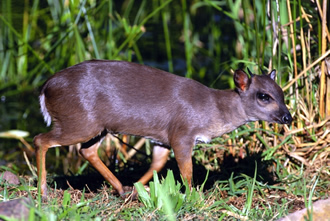Cephalophinae (duikers)
There are 18 species in this subfamily of ungulates (hoofed animals.) They are found in Africa. Duikers have compact bodies with rounded backs and powerful back legs that are longer than their front legs. Both males and females have very short, backwards pointing horns that are often hidden by tufts of fur. Most species are found in forests with dense cover. In fact, the name duiker is from the Afrikaans word for diver. When duikers are threatened or startled, they dive into the brush! |
|
 |
World Status Key
 Least Concern Least Concern  Near Threatened Near Threatened  Vulnerable Vulnerable  Endangered Endangered  Critically Endangered Critically Endangered  Extinct in the Wild Extinct in the Wild  Extinct Extinct
Status and range is taken from ICUN Redlist. If no status is listed, there is not enough data to establish status.
US Status Key
 Threatened in US Threatened in US  Threatened in NH Threatened in NH  Endangered in US Endangered in US  Endangered in NH Endangered in NH  Breeds in NH Breeds in NH  Introduced Introduced
Status taken from US Fish and Wildlife and NH Fish and Game
New Hampshire Species |
|
North/Central American Species |
| None |
|
None |
Additional Information
Key:  Profile Profile  Photos Photos  Video Video  Audio Audio
Abbot's Duiker - Cephalophus spadix    
Abbott's duiker is only found in Tanzania.
Source: Arkive Intended Audience: General Reading Level: Middle School
Bay Duikers - Cephalophus dorsalis    
Bay duikers are found in the equatorial lowland forest belt of Africa, from Senegal to Lake Tanganyika.
Source: Animal Diversity Web Intended Audience: General Reading Level: Middle/High School
Black Duiker - Cephalophus niger    
The black duiker has a brown to black coat and a long narrow head.
Source: Los Angeles Zoo Intended Audience: General Reading Level: Elementary/Middle School
Black Duiker - Cephalophus niger    
The black duiker is found from Guinea to southwestern Nigeria.
Source: Animal Diversity Web Intended Audience: General Reading Level: Middle/High School
Black-fronted Duiker - Cephalophus nigrifrons     
The black-fronted duiker gets its name from a broad black stripe that runs from its nose to its forehead.
Source: Arkive Intended Audience: General Reading Level: Middle School
Jentink's Duiker - Cephalophus jentinki    
Jentink's duiker is black from its head to its shoulders. It is grizzled gray from the back of its shoulders to its rump. A white strip separates the black region from the grizzled gray.
Source: Arkive Intended Audience: General Reading Level: Middle School
Natal Duiker - Cephalophus natalensis     
The natal duiker is found on the eastern coast of Africa in Malawi, Mozambique, South Africa, Swaziland, Tanzania, and Zambia.
Source: Arkive Intended Audience: General Reading Level: Middle School
Ogilby's Duiker - Cephalophus ogilbyi    
Ogilby's duiker is found in four separate locations within the equatorial forest zone of West Africa.
Source: Arkive Intended Audience: General Reading Level: Middle School
Peter's Duiker - Cephalophus callipygus     
Peter's duiker is found in central Africa from Cameroon and Gabon eastwards to Kenya and Tanzania.
Source: Arkive Intended Audience: General Reading Level: Middle School
Red-flanked Duiker - Cephalophus rufilatus    
Red-flanked duikers are found throughout central and western Africa.
Source: Animal Diversity Web Intended Audience: General Reading Level: Middle/High School
Red-flanked Duiker - Cephalophus rufilatus    
The red-flanked duiker has a orange-brown coat with darker brown legs and a darker brown patch of fur on its back.
Source: Oregon Zoo Intended Audience: General Reading Level: Middle/High School
Red-Flanked Duiker - Cephalophus rufilatus    
The red-flanked duiker is found from Senegal in West Africa eastward to Cameroon, Sudan, and Uganda.
Source: Los Angeles Zoo Intended Audience: General Reading Level: Elementary/Middle School
Red-flanked Duiker - Cephalophus rufilatus    
The red-flanked duiker has a black nose and black lips.
Source: St. Louis Zoo Intended Audience: General Reading Level: Elementary School
Yellow-backed Duiker - Cephalophus silvicultor     
The yellow-backed duiker is the largest species of duiker.
Source: Arkive Intended Audience: General Reading Level: Middle School
Yellow-backed Duiker - Cephalophus silvicultor     
Yellow-backed duikers are found from Senegal and Liberia ins west Africa through central and equatorial Africa into Kenya, and south to northern Angola and Zambia.
Source: Zoo Atlanta Intended Audience: General Reading Level: Middle School
Yellow-backed Duiker - Cephalophus silvicultor    
Yellow-backed duikers are black or brown in color and have a yellow triangular patch near their tail.
Source: Animal Diversity Web Intended Audience: General Reading Level: Middle/High School
Zebra Duiker - Cephalophus zebra    
The zebra duiker is found in the forests of Sierra Leone, the Ivory Coast, and Liberia.
Source: Animal Diversity Web Intended Audience: General Reading Level: Middle/High School
Zebra Duiker - Cephalophus zebra    
The zebra duiker gets its name from the bold zebra-like stripes that run from its shoulders to its rump.
Source: Arkive Intended Audience: General Reading Level: Middle School
Blue Duiker - Philantomba monticola     
The blue duiker is the smallest duiker species.
Source: Arkive Intended Audience: General Reading Level: Middle School
Blue Duiker - Philantomba monticola    
The blue duiker has a bluish-gray coat.
Source: Honolulu Zoo Intended Audience: General Reading Level: Middle School
Maxwell's Duiker - Philantomba maxwellii    
Maxwell's duiker is found in the forests of western Africa from Senegal and Gambia to Nigeria.
Source: Animal Diversity Web Intended Audience: General Reading Level: Middle/High School
Common Duiker - Sylvicapra grimmia    
Unlike other species of duiker, the common duiker is found in grasslands, although it will dive for cover in forests!
Source: Kruger National Park Intended Audience: General Reading Level: Middle School
Common Duiker - Sylvicapra grimmia   
The common duiker is also known as the gray or bush duiker. It is is found in the Sub-Saharan region of Africa from Senegal to Ethiopia.
Source: Animal Diversity Web Intended Audience: General Reading Level: Middle/High School
|

